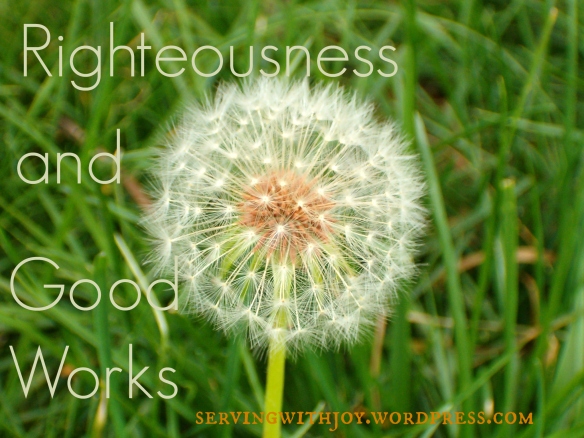 Last week I talked about being content. But I can’t stop there. I tend to err on the side of being too content.
Last week I talked about being content. But I can’t stop there. I tend to err on the side of being too content.
I’m meant to be serving God with joy, but that has softened into happiness. Which melted down into contentment – not with myself, but with my place in life. I’m often satisfied with living a socially acceptable life and letting God’s grace fill in the gaps. I’m not zealous for the Lord! I’m just satisfied with where my life is going, and that is not the same thing at all. There must be love for God’s Word, fear of His holiness, and zeal for walking in the Spirit.
Matthew 6:5 says:
Blessed are those who hunger and thirst after righteousness,
For they shall be filled.
And the Westminster Confession tells us that good works are the fruits and evidences of a true and living faith.
Good works must come from a heart that is humble and right with God. A good work can only be what is commanded in the revealed will of God. And it must be done for the kingdom and glory of God, with the intention of loving God and my neighbour.
Good works come from the Holy Spirit’s influence, but we mustn’t always wait for His special leading. Instead, we must be diligent in stirring up the grace of God in us.
“Why should we do good works if we have been saved? What purpose can there be in struggling against the flesh when salvation is sure?” you might ask. Well, I know how hard and even hopeless striving for godliness can seem in this broken world. But here are the reasons given by the Heidelberg Catechism – and, sister, these are biblical reasons!
86 Q. : Since we have been delivered by grace alone through Christ, why must we yet do good works?
A. : Because Christ, having redeemed us by his blood, also renews us by his Holy Spirit to be his image, so that with our whole life we may show ourselves thankful to God for his benefits, and he may be praised by us.
Further, that we ourselves may be assured of our faith by its fruits, and that by our godly walk of life we may win our neighbours for Christ.
The Westminster Confession Chapter 16 says that by doing good works, we show thankfulness, strengthen our assurance of salvation, edify our fellow believers, adorn the profession of the gospel, deprive our opponents of arguments against it, and glorify God. Great!
NB I am not talking about salvation by works, but life after salvation by grace.

 When I was about 13, I decided that getting married when I was 17 would be realistic, so I wrote up a chart of when I would start having children. According to that list, I gave birth to triplet girls on the 8th of February 2015 (at age 18). I would then have a son in 2017, another in 2019, have another set of girl triplets 11 months after that, and finally end up having twins, my 13th & 14th children at the age of 31.
When I was about 13, I decided that getting married when I was 17 would be realistic, so I wrote up a chart of when I would start having children. According to that list, I gave birth to triplet girls on the 8th of February 2015 (at age 18). I would then have a son in 2017, another in 2019, have another set of girl triplets 11 months after that, and finally end up having twins, my 13th & 14th children at the age of 31.